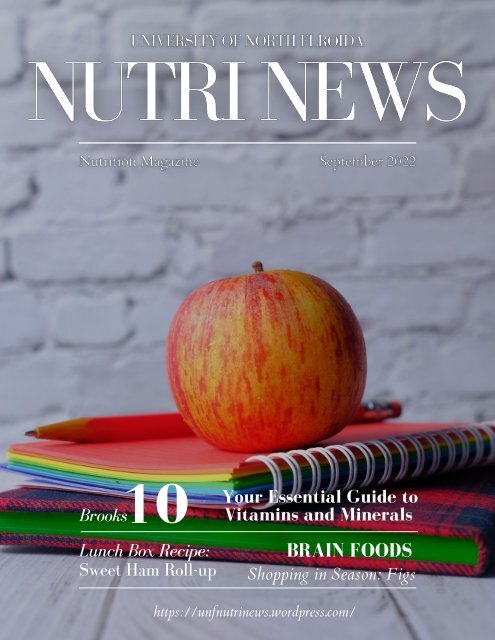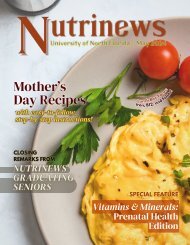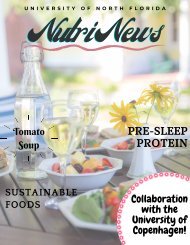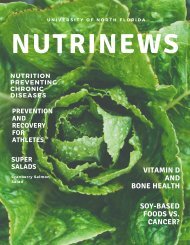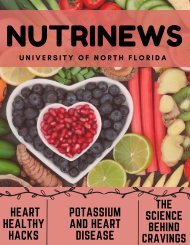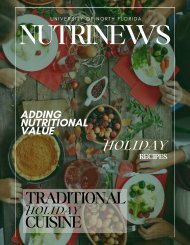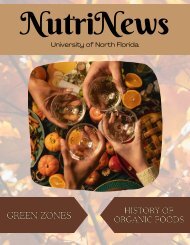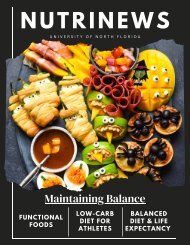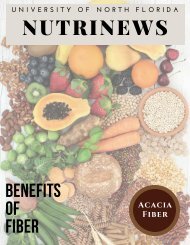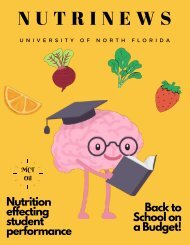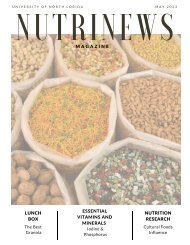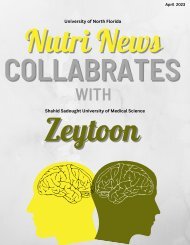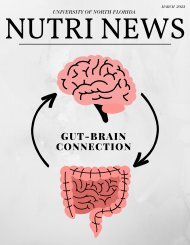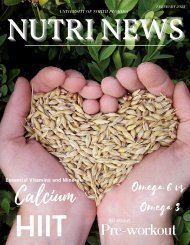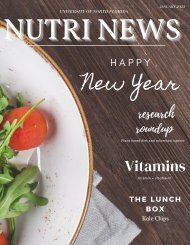Nutri News September 2022
The theme for September is Back to School!!! Articles include nutrigenetics and if a nutrient dense breakfast improves school performance. This issue also includes an easy lunch box recipe and shopping in season with figs. This month’s student spotlight is on our very own Georgina Brace and an interview with Professor Altice.
The theme for September is Back to School!!! Articles include nutrigenetics and if a nutrient dense breakfast improves school performance. This issue also includes an easy lunch box recipe and shopping in season with figs. This month’s student spotlight is on our very own Georgina Brace and an interview with Professor Altice.
Create successful ePaper yourself
Turn your PDF publications into a flip-book with our unique Google optimized e-Paper software.
Brooks<br />
10<br />
Lunch Box Recipe:<br />
Sweet Ham Roll-up<br />
Your Essential Guide to<br />
Vitamins and Minerals<br />
BRAIN FOODS<br />
Shopping in Season: Figs<br />
https://unfnutrinews.wordpress.com/
Table of Contents<br />
3<br />
MYTHBUSTING<br />
Is breakfast the most<br />
important meal of the day?<br />
5<br />
STUDENT SPOTLIGHT<br />
Georgina Brace -Brooks 10<br />
9<br />
THE LUNCH BOX<br />
Sweet Ham Roll-up<br />
11<br />
FOOD SCIENCE<br />
Brain Foods<br />
22<br />
MONTHLY HACKS<br />
Why frozen fruits and<br />
vegetables are better<br />
than fresh<br />
16<br />
FACULTY<br />
SPOTLIGHT<br />
An interview with Professor<br />
Andrea Altice<br />
24<br />
NUTRITION<br />
RESEARCH<br />
Does a nutrient dense breakfast<br />
improve school performance?<br />
18<br />
SHOPPING IN SEASON<br />
Figs<br />
26<br />
OPPORTUNITIES<br />
WITH NUTRI NEWS<br />
27<br />
29<br />
31<br />
YOUR ESSENTIAL<br />
GUIDE TO VITAMINS<br />
AND MINERALS<br />
Vitamin A<br />
INTERNATIONAL<br />
COLLABORATION<br />
<strong>Nutri</strong>genetics and how it affects<br />
my life<br />
NUTRINEWS<br />
STAFF<br />
Meet our staff!<br />
Follow us!<br />
@unfnutrinews<br />
https://unfnutrinews.wordpress.com
3<br />
Written by<br />
Dahnine Moyer<br />
Breakfast: Is it the most<br />
important meal of the day?<br />
5 Reasons why you should never skip<br />
breakfast.<br />
Breakfast is often called the most<br />
important meal of the day. As the name<br />
suggests, breakfast breaks the overnight<br />
fast, which can range from 7 to 10 hours.<br />
The foods you eat after this fast help<br />
replenish your supply of glucose, boost<br />
your energy levels, and supply a portion of<br />
the essential nutrients required for optimal<br />
health.<br />
Some of the benefits of eating breakfast<br />
include improved energy levels, increased<br />
ability to concentrate, better weight<br />
management, and reduced risk of type 2<br />
diabetes and heart disease. Despite the<br />
evidence that breakfast is healthy for you,<br />
many people often skip breakfast for<br />
various reasons. Let’s be clear,<br />
occasionally skipping breakfast isn’t the<br />
end all be all. However, having a healthy<br />
breakfast in the morning will help fuel your<br />
body for your morning activities.
4<br />
1. Breakfast keeps you healthy. Skipping<br />
breakfast doesn’t save calories that you can<br />
use later in the day. Contrary to what you may<br />
think, eating a super healthy breakfast in the<br />
morning can help keep your glucose levels in<br />
check.1 On the other hand, when you fail to<br />
eat something in the morning, you’ll end up<br />
feeling hungry throughout the day. In fact, the<br />
hunger pangs may come much quicker than<br />
you initially thought.<br />
2. Breakfast gives you energy. The energy<br />
you get from eating breakfast will help you to<br />
stay focused and fueled for the morning’s<br />
activities. You need all the nutrients in a<br />
healthy breakfast to carry out your daily tasks<br />
with ease.2 Remember that there are times<br />
when you have no choice but to wait for hours<br />
before grabbing your next bite.<br />
3. Breakfast helps you manage your weight.<br />
It sounds strange, but breakfast increases your<br />
chances of losing weight or keeping your<br />
overall weight in balance. Studies show that<br />
adopting the habit of eating breakfast in the<br />
morning can make it easier to resist the urge to<br />
eat junk foods later in the day.3 Consuming<br />
more calories in the morning and fewer as the<br />
day goes on is an effective way to maintain a<br />
healthy weight.<br />
4. Breakfast gives you much-needed<br />
nutrients. When you skip breakfast, you are<br />
skipping on nutrients. When you choose not to<br />
enjoy a hearty meal at the start of the day, the<br />
chances are that you won’t be able to make up<br />
for the lost nutrients.4<br />
5.Breakfast improves your mental capacity.<br />
There are quite a few breakfast foods that help<br />
boost your brain capacity and take your<br />
creative thoughts to the next level.5 Brain<br />
foods include whole grain toast with smoked<br />
salmon or avocado, oatmeal with blueberries,<br />
and whole grain cereals with bananas and a<br />
milk of your choice, just to name a few.6<br />
References:<br />
1. Betts JA, Chowdhury EA, Gonzalez JT, Richardson JD, Tsintzas K, Thompson D.<br />
Is breakfast the most important meal of the day? Proceedings of the <strong>Nutri</strong>tion<br />
Society. 2016;75(4):464-474. doi:10.1017/S0029665116000318<br />
2. Betts JA, Richardson JD, Chowdhury EA, Holman GD, Tsintzas K, Thompson D.<br />
The causal role of breakfast in energy balance and health: a randomized controlled<br />
trial in lean adults. The American Journal of Clinical <strong>Nutri</strong>tion. 2014;100(2):539-<br />
547. doi:10.3945/ajcn.114.083402<br />
3. O’Neil CE, Byrd-Bredbenner C, Hayes D, Jana L, Klinger SE, Stephenson-Martin<br />
S. The Role of Breakfast in Health: Definition and Criteria for a Quality Breakfast.<br />
Journal of the Academy of <strong>Nutri</strong>tion and Dietetics. 2014;114(12):S8-S26.<br />
doi:10.1016/j.jand.2014.08.022<br />
4. Ogata H, Kayaba M, Tanaka Y, et al. Effect of skipping breakfast for 6 days on<br />
energy metabolism and diurnal rhythm of blood glucose in young healthy Japanese<br />
males. The American Journal of Clinical <strong>Nutri</strong>tion. 2019;110(1):41-52.<br />
doi:10.1093/ajcn/nqy346<br />
5. Adolphus K, Lawton CL, Champ CL, Dye L. The Effects of Breakfast and Breakfast<br />
Composition on Cognition in Children and Adolescents: A Systematic Review.<br />
Advances in <strong>Nutri</strong>tion. 2016;7(3):590S-612S. doi:10.3945/an.115.010256<br />
6. Heart Foundation. Home | The Heart Foundation. www.heartfoundation.org.au.<br />
Published 2021. Accessed <strong>2022</strong>. https://www.heartfoundation.org.au/heart-healtheducation/healthy-eating
Student<br />
Spotlight<br />
Georgina Brace<br />
Brooks 10 Student<br />
My favorite quote is “we cannot become<br />
what we want, by remaining what we are”<br />
This quote reminds me that change is good<br />
and that changing also means we are growing.<br />
Who are Brooks 10 Students?<br />
<br />
5<br />
Brooks 10 students are students who serve as<br />
liaisons for their affiliated programs. Ten<br />
individuals are chosen among students from<br />
Brooks College of Health to represent the<br />
college . and their programs.<br />
What do you like about being part of Brooks 10?<br />
It's a great opportunity to be a part of Brooks<br />
10 because not only do you get to work with a<br />
great team of students, but we also have<br />
opportunities to enhance our public speaking<br />
skills, network with others on-and-off campus,<br />
work with local organizations in the community<br />
and recruit future BCH Ospreys.<br />
What do you like about being part of Brooks 10?<br />
Being a part of Brooks10 is a great honor. I<br />
was noticed by my professors and nominated<br />
to be a representative of my college. This<br />
position allows me to talk about my passion for<br />
nutrition and my program.We also receive an<br />
honors cord to wear at commencement and to<br />
me, that is a great accomplishment.<br />
What inspired you to pursue your degree?<br />
I have always been interested in the<br />
relationship between nutrition and our bodies.<br />
My journey started with getting my bachelor’s<br />
in public health with a minor in health<br />
education. I was pursuing this degree<br />
eventually in hopes of being accepted into the<br />
Nursing program at UNF, however, after taking<br />
a few nutrition-related classes, I realized that<br />
my interest in nutrition grew. After graduating<br />
with a Bachelor of Public Health degree, I<br />
continued my education and started the<br />
<strong>Nutri</strong>tion and Dietetics DPD program at UNF.<br />
What activities or hobbies do you enjoy<br />
doing outside of school?<br />
I have a strong interest in books and spend a<br />
lot of my free time reading. When I'm not<br />
reading, though, you can typically find me with<br />
my son at the zoo or the pool.
6<br />
What advice would you give to incoming students<br />
entering the UNF?<br />
Currently, I am a lead coordinator for Meals on Wings<br />
which is a program that provides meals for vulnerable<br />
seniors in our community. I love being part of such an<br />
amazing organization with great mentors.<br />
What has been most challenging to you since<br />
beginning your program here at UNF?<br />
I think the most challenging part of the <strong>Nutri</strong>tion and<br />
Dietetics program, is the time-management aspect. We<br />
have a heavy course load in the first semester when<br />
the program starts, and our classes are full of<br />
important information, you must be willing to put in<br />
the hours if you want to learn. However, I believe that<br />
our curriculum is designed to challenge us in several<br />
ways, including the collaboration, critical thinking, and<br />
project-based tasks that we accomplish.<br />
What has been your favorite class in the<br />
<strong>Nutri</strong>tion and Dietetics Program?<br />
I can't say that I've had a favorite class. Each course in<br />
my opinion has been both challenging and enjoyable,<br />
and it’s teaching me a ton. I am extremely<br />
appreciative to have such amazing, committed<br />
professors who are all so well-versed in the subject of<br />
nutrition. We have such a wonderful network of<br />
experts who are so happy to answer all our<br />
questions, whether they are about the field of<br />
community, research, food science, or just the<br />
metabolism of nutrients.<br />
I would advise prospective students to utilize<br />
the tools available to them and get involved<br />
with the program. I didn't make use of the<br />
study sessions or tutoring center when I was<br />
a first-year student, as much as I should have.<br />
I was also very intimidated by my instructors<br />
and didn't want to trouble them by emailing<br />
them. My strongest piece of advice is to ask<br />
for assistance, your professors are there to<br />
help. Participating in your program also<br />
enables you to meet your classmates and<br />
create relationships that will flourish<br />
throughout your time at UNF.<br />
What plans and goals do you have after<br />
graduation?<br />
After graduation, I will be continuing my<br />
education and pursuing my master’s degree<br />
in nutrition. After my master’s, I will be<br />
studying for the Registered Dietitian exam.<br />
Once I pass my exam, I hope to either work<br />
for the state as a Registered Dietitian for WIC,<br />
or I would love to work in corporate wellness.<br />
I eventually hope to teach nutrition at the<br />
collegiate level and obtain my Ph.D.<br />
Favorite color? Anything neutral<br />
Favorite food? Mexican Food<br />
Favorite book? Do not have one because I love<br />
so many<br />
Favorite pastime? Gardening<br />
Biggest fear? Not getting to see enough of the<br />
world<br />
Greatest motivation? My son
AUGUST 22
The Lunch Box<br />
By: Kate Overby<br />
Quick and Easy Sweet Ham Rolls for<br />
Back to School!<br />
Ingredients:<br />
-4 flour tortillas<br />
-4 tbsp fat-free cream cheese<br />
-1 tsp mustard<br />
-8 thin slices of ham<br />
-4 tbsp shredded cheddar cheese<br />
-1 small apple sliced into slivers the size<br />
of toothpicks<br />
Directionss:<br />
1.Spread 1 tbsp cream cheese over each<br />
tortilla.<br />
2.Add a ¼ tsp dollop of mustard to the<br />
center of the tortillas.<br />
3.Top each tortilla with 2 slices of ham, 1<br />
tbsp cheddar, and ¼ of the slivered<br />
apples.<br />
4.Tightly roll each tortilla into a wrap.<br />
5.Enjoy right away or wrap the rolled<br />
tortillas in plastic wrap and refrigerate<br />
for a delicious next day lunch!<br />
9<br />
Reference:<br />
Foods Rby M. Sweet Ham roll-ups. Allrecipes.<br />
https://www.allrecipes.com/recipe/216627/sweet-ham-rollups/.<br />
Accessed August 15, <strong>2022</strong>.
C E L E B R A T E<br />
LABOR DAY
11<br />
B R A I N<br />
F O O D S<br />
By: Isabelle Brazelton<br />
What does the term “brain food”<br />
mean?<br />
We’ve all heard of “brain food,” but<br />
what exactly does that term even<br />
mean? What is considered “brain<br />
food,” and why? Well, simply put,<br />
the term “brain food” refers to foods<br />
that help improve, maintain, and<br />
optimize the performance and<br />
health of the brain, both in the<br />
short term and long term.1 Many<br />
factors, including nutrition,<br />
contribute to the functional<br />
properties of our brains. Over the<br />
years, the role of diet, particularly in<br />
mental health, has gained much<br />
recognition, and nutrition has<br />
become a key consideration when<br />
treating psychiatric disorders.<br />
Because of this growing<br />
understanding of food’s role in<br />
mental health and brain activity,<br />
certain foods have become<br />
recognized as “brain foods” for their<br />
specific abilities to support brain<br />
function.
12<br />
W H A T F O O D S<br />
A R E C O N S I D E R E D<br />
" B R A I N F O O D S "<br />
Leafy Greens<br />
Leafy green vegetables like spinach,<br />
kale, collard greens, and broccoli are all<br />
high in nutrients, such as vitamin K,<br />
folate, lutein, and beta carotene. These<br />
nutrients have been shown to support<br />
brain health and potentially slow<br />
cognitive decline.2 Vitamin K<br />
specifically is a fat-soluble vitamin that<br />
is required for the formation of a type of<br />
necessary fat in brain cells known as<br />
sphingolipids. Additionally, some<br />
studies have shown that older adults<br />
with high vitamin K intake have<br />
stronger cognitive function and better<br />
memory.3<br />
Fatty Fish<br />
Fatty fish like salmon, tuna, herring,<br />
trout, and sardines are rich sources of<br />
omega-3 fatty acids.2,3 Omega-3s are<br />
extremely important for brain health<br />
because roughly 60% of the brain is<br />
composed of fat, half of which is made<br />
of omega-3 fatty acids. Healthy<br />
unsaturated fats, such as omega-3s,<br />
have also been linked to lower levels of<br />
a protein known as beta-amyloid. Betaamyloid<br />
may be responsible for the<br />
formation of damaging clumps in the<br />
brain of individuals with Alzheimer's.
13<br />
Coffee & Tea<br />
One thing that both coffee and tea have<br />
in common is caffeine. Caffeine<br />
improves alertness, performance, mood,<br />
memory, and focus in the short term,<br />
while also supporting long-term mental<br />
function and the retention of new<br />
memories.2,3 In addition to caffeine,<br />
coffee contains a number of<br />
antioxidants and has been shown to<br />
reduce the risk of Parkinson’s and<br />
Alzheimer’s disease when consumed for<br />
a long period of time and in significant<br />
quantities. Furthermore, green tea has<br />
several compounds that solidify its<br />
status as a “brain food,” namely L-<br />
theanine. L-theanine is an amino acid<br />
that increases the activity of GABA: a<br />
neurotransmitter that works to reduce<br />
anxiety and increase relaxation. Green<br />
tea also contains polyphenols and<br />
antioxidants, which may help protect<br />
the brain.<br />
Nuts<br />
Nuts are most widely known for<br />
supporting heart health, but they also<br />
support brain health.2,3 Studies have<br />
shown that consuming nuts regularly<br />
has the potential to improve memory<br />
and lower the risk of cognitive decline.<br />
This is likely due to the composition of<br />
the healthy fats, proteins, antioxidants,<br />
and vitamin E found in most nuts.<br />
Walnuts are of special note because of<br />
their high concentration of omega-3<br />
fatty acids, which were previously<br />
discussed as playing a large role in brain<br />
health.
Berries<br />
Berries possess antioxidant compounds known as flavonoids.1,2 The particular flavonoids in berries are<br />
called anthocyanins, which are compounds known for producing the rich and vibrant colors seen in<br />
berries, as well as having specific anti-inflammatory properties. Flavonoids, when consumed regularly,<br />
have been proven to support memory and potentially delay cognitive decline. This is due to the<br />
protection that antioxidants provide against oxidative stress and inflammation, both of which<br />
contribute to brain deterioration and the development of neurodegenerative diseases. Blueberries<br />
specifically have been shown to enhance communication between brain cells, thereby improving<br />
memory and cognitive processes.<br />
Eggs<br />
If one thing is certain, it is that eggs are a superfood worth integrating into every diet. Eggs are a good<br />
source of choline, folate, B6, and B12, which are all nutrients strongly linked to improved brain health.3<br />
Choline in particular plays an important role in the regulation of both memory and mood, with high<br />
intakes being correlated with stronger memory and cognitive function. Although not much research has<br />
been done on eggs and brain function specifically, the aforementioned nutrients have been shown to<br />
play a significant role in brain health.<br />
Dark Chocolate<br />
Finally, we have a fan favorite: dark chocolate. Cocoa powder and dark chocolate (which is at least 70%<br />
cacao) contain several compounds that can enhance mental function, such as antioxidants, flavonoids,<br />
and caffeine.2,3 Some research has shown that people who frequently consume dark chocolate<br />
actually perform better in mentally demanding tasks. So, next time you go for that chocolate bar, go for<br />
dark chocolate!<br />
References<br />
1. Ekstrand B, Scheers N, Rasmussen M, Young J, Ross A, Landberg R. Brain foods - the role of diet in brain performance and health. <strong>Nutri</strong>tion Reviews. 2020;79(6):693-708. doi:10.1093/nutrit/nuaa091<br />
1. Foods linked to better brainpower. Harvard Health. Published March 6, 2021. Accessed July 30, <strong>2022</strong>. https://www.health.harvard.edu/healthbeat/foods-linked-to-better-brainpower<br />
1. Jennings K. 11 Best Foods to Boost Your Brain and Memory. Healthline. Published June 4, 2021. Accessed July 30, <strong>2022</strong>. https://www.healthline.com/nutrition/11-brain-foods#TOC_TITLE_HDR_6<br />
14
N A T I V E<br />
A M E R I C A N<br />
D A Y<br />
<strong>September</strong> 23
16<br />
Staff Spotlight<br />
LETS LEARN A LITTLE<br />
MORE ABOUT<br />
PROFESSOR ALTICE<br />
Q & A STYLE!<br />
1.Tell us about your background in<br />
nutrition from education to experience<br />
and how you came to be at UNF.<br />
WHO IS THIS<br />
MONTH'S STAFF<br />
SPOTLIGHT?<br />
Professor Andrea Altice<br />
I completed my B.S. in food and nutrition at<br />
Florida State University in 1986 and completed<br />
my M.S. in Health Science at University of<br />
North Florida in 1989.<br />
After I graduated from the University of North<br />
Florida, I was hired as a clinical dietitian at<br />
Methodist Hospital which is now a part of<br />
Shands Jacksonville. During my time at<br />
Methodist Hospital, I found that I liked<br />
working with the renal patients.After 11 years at<br />
Methodist Hospital, I accepted a renal dietitian<br />
position at St. Augustine Artificial Kidney<br />
Center. In 2005, I started my role as an adjunct<br />
instructor at UNF teaching Basic Principles of<br />
<strong>Nutri</strong>tion, the Food Fundamentals and Food<br />
Science Labs. In 2014, I took on the role of the<br />
Food Lab Coordinator and instructor of the<br />
food labs and absolutely love it!
17<br />
2. What is a message that you would like<br />
the public to know about the importance<br />
of nutrition?<br />
What I would like the public to know about<br />
nutrition is that eating healthy foods in the<br />
right amounts along with physical activity is<br />
critical for growth and development and can<br />
help to prevent certain diseases such as<br />
diabetes, heart disease, hypertension, and<br />
certain cancers.<br />
3. What is the role of dietitians in<br />
supporting the health of people in our<br />
community?<br />
Community dietitians assess the nutritional<br />
needs of specific groups of people and develop<br />
programs and resources that promote healthy<br />
food choices that are easily accessible.<br />
4. What drew you to pursue a career in<br />
dietetics?<br />
What drew me to pursue a career in dietetics is<br />
my love of planning meals and wanting to<br />
educate people on the relationship between<br />
nutrition and certain diseases.<br />
5. In the field of dietetics, what do you<br />
feel has been a big challenge that you<br />
have had to overcome?<br />
A big challenge that I had to overcome was<br />
during the pandemic I had to move the food<br />
labs online. This was a challenge because food<br />
labs are a hands-on course. However, I<br />
overcame this challenge by recording the<br />
experiments so the students could have the<br />
same experience.<br />
6. What advice do you have for students<br />
pursuing a degree in dietetics?<br />
My advice for students pursuing a degree in<br />
dietetics is that the field of dietetics is a<br />
rewarding career in that you will be the<br />
nutrition expert helping to change people’s<br />
lives.<br />
7. What’s your favorite part about being a<br />
professor?<br />
My favorite part about being a professor is<br />
working closely with the students in the food<br />
lab because I can give more individualized<br />
attention in helping them learn important<br />
skills.<br />
8. Can you tell us a fun fact about<br />
yourself that many people may not<br />
know?<br />
Growing up, I learned how to play the piano,<br />
played the clarinet, and was in the marching<br />
band in high school. I presently play handbells<br />
in my church.
18<br />
Written by: Alicia Scott<br />
All About<br />
Figs<br />
Adriatic Figs<br />
Figs are said to originate from Western Asia and can<br />
be traced back to 5,000 BC. The fig tells a complex<br />
symbolic story in culinary history because it was used<br />
to sweeten dishes before the widespread use of<br />
sugar.1 The fig tree was introduced in the New World<br />
through Mexico in 1560 and one of the most popular<br />
commercial products since then has been Fig<br />
Newtons which were developed in 1891.1 One of the<br />
most interesting things about figs is that the fruit of<br />
the plant is an inverted flower. The fig tree is<br />
respected and even sacred in certain religions such<br />
as Islam where it is one of the two most sacred trees<br />
of the religion.2 In other religions such as<br />
Christianity, Hinduism, and others, it is seen as a sign<br />
of peace, fertility, and prosperity.1<br />
There are well over 700 different varieties of figs<br />
however, there are nine varieties that are more<br />
known than the others, and here are the top five<br />
varieties within those nine. The first variety is<br />
Celeste, this variety is pear-shaped, with purplish<br />
skin and the pulp is more of white or pink color.3 The<br />
flavor profile is excellent, and it is almost seedless.<br />
The second variety is Brown Turkey, and this variety<br />
has a broader shape than the Celeste with coppercolored<br />
skin and the pulp can go from a white color<br />
to a light red. This variety can thrive in warmer<br />
climates and can be found growing all over<br />
Hawaii.3 Brunswick otherwise called Magnolia is<br />
another variety and compared to the other two<br />
mentioned, it has a narrow lobed shape with a<br />
bronze or purple-brown color. Leaving the more<br />
purple color family, Marseilles otherwise called<br />
Lemon is known for its yellow-green color and round<br />
shape with large seeds.3 In the yellow-green color<br />
family, there is the Adriatic variety with a distinct<br />
flavor and good quality, and this variety is known for<br />
its turbinate shape with a thick, short neck.<br />
Celeste Figs<br />
Brunswick Figs
19<br />
Buying fruits can come with some pressures such<br />
as is the fruit ripe enough, is it going to be spoiled<br />
on the inside, and trying not to get the ones<br />
where the outside is mushy. Here are some tips to<br />
use when buying figs to hopefully eliminate some<br />
of the pressure. The first tip is to find the fruit that<br />
is soft to the touch but not too mushy and this can<br />
indicate the level of ripeness and flavor. If the<br />
fruit is too hard then the ripening process will not<br />
continue.2 It is also important to pay attention to<br />
the type of fig because each type will vary in<br />
color as the fruit ripens. Using your other senses<br />
such as your nose is also a great way to identify<br />
the freshness. If the smell is on the sour side,<br />
unfortunately, that means that the fig has started<br />
to ferment, so it is best to stay away from those.<br />
There are several ways a fig can be eaten. All<br />
parts of the fig can be eaten starting with the<br />
skin. The skin can be either thin or thicker and this<br />
is dependent on how early or late in the season it<br />
is picked. If you have access to a fig tree, the fig<br />
could simply be picked and eaten whole with the<br />
seeds intact.4 Figs can also be stored and one of<br />
those methods is by refrigerating. They can last up<br />
to a week stored in a container in the fridge but<br />
because of the delicacy of the fruit, it is<br />
recommended to consume them as soon as<br />
possible.2 They can also be dehydrated and is an<br />
excellent way to store them if there is an<br />
abundance. Another way to eat figs would be by<br />
cooking them. They can be roasted, baked, added<br />
to salads, or used in a stuffing that can be paired<br />
with some form of protein. Making a preserve<br />
such as a jam is another way to cook and eat figs<br />
while maintaining that nutritional profile. The<br />
featured recipe for this month is a Fig Jam that<br />
can be paired with foods such as toast, biscuits,<br />
and cheeses such as brie, gorgonzola, and others.<br />
It is also a popular staple on charcuterie boards.<br />
This recipe is courtesy of Rachel Smith.
References<br />
1. Filippone PT. The sweetness of figs from Garden of Eden to modern day. The Spruce Eats. https://www.thespruceeats.com/history-of-figs-1807598#:~:text=Ficus%20carica%20L.%2C%20com. Published June 27,<br />
2019. Accessed July 31, <strong>2022</strong>.<br />
2. Figs. FoodPrint. https://foodprint.org/real-food/figs/. Published <strong>September</strong> 27, 2021. Accessed July 31, <strong>2022</strong>.<br />
3. Morton JF. Fig. In: Fruits of Warm Climates. Echo Point Books & Media; 2013:47-50.<br />
4. Mattison LD. How to eat figs (even if they're raw!). Taste of Home. https://www.tasteofhome.com/article/how-to-eat-figs/. Published October 3, 2019. Accessed July 31, <strong>2022</strong>.<br />
5. Smith R, Maria, Raquel, et al. The best quick homemade Fig Jam Recipe. Foodal. https://foodal.com/recipes/jams-and-jellies/easy-fig-jam/. Published June 7, <strong>2022</strong>. Accessed July 20, <strong>2022</strong>.<br />
20<br />
Fig Jam Recipe<br />
Ingredients<br />
1 lb. black figs<br />
3/4 cup granulated sugar<br />
1/4 cup water<br />
2 tsp lemon juice (juice of 1/2<br />
small lemon)<br />
1 tsp pure vanilla extract<br />
Preparation<br />
1. Remove stems from figs, then puree them in a food<br />
processor or blender until mostly smooth<br />
2. Transfer the fig paste to a medium-sized pot. Stir in the<br />
sugar, water, and lemon juice and bring to a boil over<br />
medium-high heat, then reduce heat to medium.<br />
3. Boil while stirring nearly constantly, until it becomes jamlike<br />
in consistency. At this point, it’ll look kind of shiny and<br />
will fall off a spoon in bigger clumps or sheets, as opposed<br />
to small drips. If you are unsure, turn off the heat and<br />
place a bit of the jam on a cold plate (stuck in the freezer<br />
before you begin), let it sit for a minute or so, then check<br />
the consistency to see if it is jam-like. If needed, return to<br />
the heat for a few more minutes.<br />
4. After cooking, remove from the heat and stir in the<br />
vanilla extract.<br />
5. Carefully transfer the jam to a clean jar and screw on<br />
the lid without tightening. Let it cool for an hour then<br />
transfer to the fridge still leaving the lid loose. Tighten the<br />
lid once the jam has cooled completely. Store in the<br />
refrigerator.
WOMEN'S<br />
EQUALITY<br />
DAY<br />
AUGUST 26
22<br />
M O N T H L Y H A C K<br />
WHY FROZEN<br />
FRUITS AND<br />
VEGETABLES ARE<br />
BETTER THAN<br />
FRESH<br />
B y A s a l A b b a s z a d e h<br />
Fruits and vegetables are nutritionally essential to<br />
one’s diet because they are major dietary sources of<br />
vitamins, minerals, sugars, and organic acids.1 They<br />
also provide many health-promoting compounds, such<br />
as dietary fiber and antioxidants.1 The commercial<br />
availability of produce is important, as it should be<br />
easily accessible at the consumer level. Many<br />
consumers believe that fresh fruits and vegetables are<br />
nutritionally superior to their frozen counterparts.<br />
However, research has revealed that frozen produce<br />
actually has a higher vitamin content than fresh<br />
produce.<br />
As fruits and vegetables are living biological systems,<br />
they continue to experience metabolic changes even<br />
after they have been harvested.3 By the time the<br />
produce has reached our hands, the nutritional value<br />
may have already decreased by half due to the rate of<br />
respiration. The rate of respiration is directly associated<br />
with ripening changes, which can lead to product<br />
deterioration.3 The quality of harvested goods cannot<br />
be improved any further; however, scientists
23<br />
have researched different treatments used to<br />
manipulate the ripening process of fresh produce.3<br />
Freezing can slow down the metabolic activity of fruits<br />
and vegetables to maintain peak nutritional quality until<br />
the food is consumed. Freezing can also extend the<br />
storability and shelf life of produce, thereby ensuring<br />
maximum market value.<br />
Overall, it is important to understand that frozen<br />
produce is a viable option and that it has little to no<br />
nutritional differences when compared to fresh<br />
produce.2,3 Additionally, frozen fruits and vegetables<br />
are more affordable and have longer shelf lives,<br />
allowing you to consume them at their peak ripeness<br />
whenever you desire. By choosing frozen produce, you<br />
can enjoy your favorite fruits and vegetables yearround.<br />
References:<br />
1. Smilanick JL. Postharvest Diseases of Fruits and Vegetables:<br />
Development and Control. Postharvest Biology and Technology.<br />
2004;31(2):213. doi:10.1016/j.postharvbio.2003.11.007<br />
2. Bouzari A, Holstege D, Barrett DM. Vitamin Retention in Eight Fruits and<br />
Vegetables: A Comparison of Refrigerated and Frozen Storage. Journal<br />
of Agricultural and Food Chemistry. 2015;63(3):957-962.<br />
doi:10.1021/jf5058793<br />
3. Pott DM, Vallarino JG, Osorio S. Metabolite Changes during Postharvest<br />
Storage: Effects on Fruit Quality Traits. Metabolites. 2020;10(5):187.<br />
doi:10.3390/metabo10050187
Does a <strong>Nutri</strong>ent Dense Breakfast<br />
Improve School Performance?<br />
<br />
Written by:<br />
Sofie Van<br />
Moorleghem<br />
From the government to our parents,<br />
we have always been told to eat a<br />
healthy breakfast to start the day off<br />
right. However, does this actually have<br />
any scientific backing? Many scientists<br />
have sought to answer this question<br />
and there is an answer!<br />
In almost all the research that has<br />
been done, there has been mostly<br />
affirmative results to prove that a<br />
nutrient dense breakfast does in fact<br />
improve scholarly performance. The<br />
University of Harvard conducted a<br />
study to evaluate students’<br />
performance based of the content in<br />
the student’s breakfast. The university<br />
divided the students in two groups,<br />
one group was serve a healthy, wellround<br />
breakfast and the other group<br />
did not; the researchers discovered<br />
that the children who ate the<br />
breakfast, not only had higher grades<br />
in total, but were more attentive and<br />
had fewer issues, emotionally and<br />
behaviorally.1 Overall, they found that<br />
as the children in group two were<br />
hungry, there was more agitation,<br />
behavioral problems, and more<br />
distraction. Similar findings were<br />
observed in another study with<br />
more than 133 students over the<br />
course of four months. In this study<br />
2/3 of the students who were eating<br />
a consistent breakfast had better<br />
attendance, decreased anxiety, and<br />
better grades. After these results,<br />
more studies were conducted to<br />
examine the accuracy of these<br />
findings.<br />
Similar results were observed in a<br />
cohort study that had 835<br />
participants and in a longitudinal<br />
study that had 835 participants.2<br />
Both of these studies evaluated if<br />
there was a long-term correlation<br />
between their cognitive function<br />
and regular consumption of<br />
breakfast. This was assessed using<br />
24
References<br />
1.Kathryn Lauren Filling. Does eating breakfast improve school performance? | SiOWfa14 Science in Our World: Certainty and Cont. Psu.edu. Published October 9, 2014.<br />
https://sites.psu.edu/siowfa14/2014/10/09/7931/ Accessed July 18, <strong>2022</strong>.<br />
2.Liu, J., Wu, L., Um, P., Wang, J., Kral, T., Hanlon, A., & Shi, Z. (2021). Breakfast Consumption Habits at Age 6 and Cognitive Ability at Age 12: A Longitudinal Cohort Study. <strong>Nutri</strong>ents, 13(6),<br />
2080. https://doi.org/10.3390/nu13062080<br />
3.Taras H. (2005). <strong>Nutri</strong>tion and student performance at school. The Journal of school health, 75(6), 199–213. https://doi.org/10.1111/j.1746-1561.2005.00025.x<br />
<br />
25<br />
questionaries of the children at the<br />
ages of 6 and 12 and through their IQ<br />
with academic achievement reports.<br />
The 6-year long results showed that<br />
children that had normal, regular<br />
breakfast patterns were linked with a<br />
higher IQ and enhanced cognitive<br />
function, especially with consumption<br />
of grains and meat or eggs.<br />
Therefore, since there is no evidence<br />
that that mineral and vitamin<br />
supplementation aids in academic<br />
performance, it can be concluded that<br />
the actual consumption of food<br />
(breakfast) is what helps students be<br />
more attentive and increase learning<br />
throughout the school day. Free<br />
breakfast programs at schools have<br />
shown through research to enhance<br />
all cognitive functioning, attendance,<br />
and school performance in students.<br />
Thus, eating breakfast is the best way<br />
to improve the ability to learn in<br />
children and increase school<br />
performance.3
27<br />
Your Essential<br />
Guide to Vitamins &<br />
Minerals<br />
W O R D S B Y S O F I E V A N<br />
M O O R L E G H E M<br />
This month we are looking at Vitamin A!<br />
Vitamin A is an important fat-soluble vitamin that is<br />
critical to many areas of bodily function, especially<br />
in its form of retinol or retinoic acid. The amount<br />
that you should be getting every day is 700 mcg<br />
(micrograms) for women and 900 mcg for men.<br />
Some foods where you can find your daily Vitamin<br />
A1<br />
Dairy Products<br />
Cheddar Cheese<br />
Butter<br />
Liver<br />
Green leafy vegetables<br />
Spinach<br />
Kale<br />
Collard Green<br />
Orange Foods with Beta-carotene—this is<br />
because vitamin A can be converted from Betacarotene<br />
by your body!<br />
Carrots<br />
Cantaloupe<br />
Egg Yolks<br />
Sweet potatoes<br />
Vitamin A contains a variety of qualities that aid in<br />
enhancing biological function and sustain tissues in<br />
a variety of ways, including growth, reproduction,<br />
immunity, and cell division. Vitamin A also works as<br />
an antioxidant characteristic that fights against<br />
free radicals--which are molecules that play a part<br />
in chronic diseases like cancer
28<br />
and heart disease.1 Most significantly, Vitamin A is<br />
recognized for its major purpose in eye health and<br />
vision since it is vital in maintaining and protecting<br />
your cornea (the outer layer of the eye) as well as<br />
the thin membrane or conjunctiva that covers the<br />
exterior of your eyes and inside your eyelids. This<br />
occurs because a protein called opsin combines<br />
with the active form of vitamin A or retinal, to form<br />
a molecule that aids in low light and color vision<br />
called rhodopsin.2<br />
These are all crucial, which is why it is critical to<br />
ensure that you are getting the proper quantity.<br />
Unfortunately, because vitamin A is a fat-soluble<br />
vitamin, it can cause both deficiency and toxicity.<br />
If you are deficient or consume less than 700 mcg<br />
per day, you may have a higher risk of infection,<br />
skin difficulties, pregnancy troubles, and blindness.<br />
Vitamin A insufficiency is the leading cause of<br />
avoidable blindness (in children) worldwide. Due to<br />
restricted dietary sources, deficiency is especially<br />
common in infants, those with cystic fibrosis, and<br />
vegans. However, if you consume too much vitamin<br />
A and exceed the tolerated upper limit of 3,000<br />
mcg, you may have nausea, vomiting, joint/bone<br />
pain, eyesight abnormalities, and liver damage,<br />
among other symptoms. Toxicity is uncommon,<br />
although it can occur as a result of high vitamin A<br />
consumption, such as liver and supplements.2 As a<br />
result, it is critical to consult with your doctor or a<br />
dietitian to ensure that you are getting adequate<br />
vitamins and minerals.<br />
Remember that Vitamin A is a fat-soluble vitamin,<br />
and your body is quite good at storing what it<br />
requires to function properly. In general, a healthy,<br />
well-balanced diet provides adequate Vitamin A,<br />
but if you believe you require more or less, consult<br />
your doctor or a local dietician!<br />
Resources:<br />
1. Vitamin A. Mayo Clinic. Published 2020.<br />
https://www.mayoclinic.org/drugs-supplementsvitamin-a/art-20365945<br />
Accessed July 23, <strong>2022</strong>.<br />
2. Kubala J. Vitamin A: Benefits, Deficiency, Toxicity,<br />
and More. Healthline. Published April 5, <strong>2022</strong>.<br />
https://www.healthline.com/nutrition/vitamin-a<br />
Accessed July 23, <strong>2022</strong>.
29<br />
<strong>Nutri</strong>genetics<br />
and how it<br />
affects my life!<br />
By: Graciela Llanos<br />
Becerra, Daniela Guerrero<br />
Rodríguez & Fabiola<br />
Márquez Sandoval<br />
Have you ever wondered why the same diet doesn't work for all people? Why<br />
despite following a similar eating style, some people more susceptible to<br />
developing some diseases? Why do some people gain weight more easily than<br />
others? or why do some people find it harder to lose weight? Answers to these<br />
and other questions may be in our genes, and the study of nutrigenetics can<br />
help us to find them.<br />
<strong>Nutri</strong>genetics is the science that studies the genes-nutrient relationship;<br />
specifically, it explores how each person responds to nutrients according to<br />
their genetic profile. A genetic profile is the set of genes that each person<br />
possesses. A person has between 20,000 and 25,000 genes within DNA that are<br />
inherited from parents. More than 99% of genes are similar from one person to<br />
another, which means that less than 1% of these are different between people.<br />
These slight genetic variations make each person unique. In genes, we can find<br />
all characteristics that determine our physical appearance, our way of being,<br />
and how we respond to stimuli like food's nutrients.<br />
In this way, nutrigenetics helps us know if our genetic variations influence how<br />
we respond to nutrients in the diet, what our nutrient requirements are, and if<br />
we are predisposed to developing diseases of nutritional origin. The main<br />
objective of nutrigenetics is to achieve personalized nutrition, that is, to provide<br />
the amount and type of nutrient that each person needs.
30<br />
<strong>Nutri</strong>genetics application can be clearly<br />
seen in diseases originating from a single<br />
gene mutation. A classic example is<br />
galactosemia disease; people affected by<br />
this mutation cannot properly process a<br />
type of sugar called galactose, so galactose<br />
builds up in the blood and is toxic. People<br />
with galactosemia benefit from diets low in<br />
galactose, which is found in foods like milk<br />
and dairy products. This is an example that<br />
nutrigenetics can be very useful in providing<br />
each person with a tailored diet according<br />
to their genetic profile.<br />
However, the challenge is in treating<br />
multifactorial diseases, which represent the<br />
leading causes of death globally like<br />
obesity, dyslipidaemia, diabetes,<br />
cardiovascular diseases, and cancer. The<br />
development of these diseases depends on<br />
genetic and external factors, like physical<br />
inactivity, consumption of toxic substances,<br />
environmental pollution, and type of diet. A<br />
genetic factor only increases disease<br />
susceptibility, but it does not mean that<br />
disease will develop.<br />
Considering the complexity of multifactorial<br />
diseases, would nutrigenetics be equally<br />
useful to treat this type of disease? Would it<br />
be correct to carry out dietary interventions<br />
using only the genetic component? Should<br />
nutrigenetics be integrated into clinical<br />
practice? Are we ready for it?<br />
The reality is that nutrigenetics cannot be<br />
applied at this moment rigorously and in<br />
isolation because personalized nutrition not<br />
only depends on our genetic profile, but<br />
there are also many other factors such as<br />
psycho-emotional, social factors, and other<br />
external factors previously mentioned.<br />
Therefore, knowing the genetic profile it's<br />
not enough to create new interventions or<br />
nutritional recommendations.<br />
So, which would be the utility for<br />
nutrigenetics in our present? On the one<br />
hand, knowing about the genetic risk for<br />
certain diseases can be a motivator to<br />
make lifestyle changes and thus prevent<br />
the development of diseases. On the other<br />
hand, nutrigenetics could be helpful to<br />
people who do not respond to specific<br />
dietetic treatments; in this sense, it could<br />
help modify the strategy to provide a more<br />
precise and efficient treatment.<br />
In conclusion, the information that offers<br />
nutrigenetic science is essential to provide<br />
a more precise and efficient nutritional<br />
intervention and predict the predisposition<br />
to future health problems, which represents<br />
a promising preventive tool. However, it is<br />
crucial to consider that the ideal diet for<br />
each person should not only consider the<br />
genetic factor because diet depends on<br />
other non-biological factors like food<br />
availability, psychosocial, cultural, and<br />
economic factors. For this reason, other<br />
disciplines should support nutrigenetics and<br />
be made up of a multidisciplinary team that<br />
correctly translates the scientific<br />
information into nutritional counselling that<br />
provides real benefits for patients.<br />
References:<br />
1. Camp KM, Trujillo E. Position of the academy of nutrition and dietetics: <strong>Nutri</strong>tional<br />
genomics. J Acad Nutr Diet. 2014;114(2):299-312. doi:10.1016/j.jand.2013.12.001<br />
2. Peña-Romero AC, Navas-Carrillo D, Marín F, Orenes-Piñero E. The future of nutrition:<br />
<strong>Nutri</strong>genomics and nutrigenetics in obesity and cardiovascular diseases. Crit Rev Food Sci<br />
Nutr. 2018;58(17):3030-3041. doi:10.1080/10408398.2017.1349731<br />
3. Floris M, Cano A, Porru L, et al. Direct-to-consumer nutrigenetics testing: An overview.<br />
<strong>Nutri</strong>ents. 2020;12(2):1-13. doi:10.3390/nu12020566<br />
4. Vesnina A, Prosekov A, Kozlova O, Atuchin V. Genes and eating preferences, their roles in<br />
personalized nutrition. Genes (Basel). 2020;11(4). doi:10.3390/genes11040357<br />
5. Barrea L, Annunziata G, Bordoni L, Muscogiuri G, Colao A, Savastano S. <strong>Nutri</strong>genetics—<br />
personalized nutrition in obesity and cardiovascular diseases. Int J Obes Suppl. 2020;10(1):1-<br />
13. doi:10.1038/s41367-020-0014-4<br />
6. Guasch-Ferré M, Dashti HS, Merino J. <strong>Nutri</strong>tional genomics and direct-to-consumer genetic<br />
testing: An overview. Adv Nutr. 2018;9(2):128-135. doi:10.1093/advances/nmy001<br />
7. Ferguson LR, De Caterina R, Görman U, et al. Guide and Position of the International<br />
Society of <strong>Nutri</strong>genetics/<strong>Nutri</strong>genomics on Personalised <strong>Nutri</strong>tion: Part 1 - Fields of Precision<br />
<strong>Nutri</strong>tion. J <strong>Nutri</strong>genet <strong>Nutri</strong>genomics. 2016;9(1):12-27. doi:10.1159/000445350<br />
8. Vallée Marcotte B, Cormier H, Garneau V, Robitaille J, Desroches S, Vohl MC. Current<br />
knowledge and interest of French Canadians regarding nutrigenetics. Genes Nutr.<br />
2019;14(1):1-7. doi:10.1186/s12263-019-0629-7<br />
9. Hannon BA, Khan NA, Teran-Garcia M. <strong>Nutri</strong>genetic contributions to dyslipidemia: A focus<br />
on physiologically relevant pathways of lipid and lipoprotein metabolism. <strong>Nutri</strong>ents.<br />
2018;10(10). doi:10.3390/nu10101404<br />
10. Kohlmeier M, De Caterina R, Ferguson LR, et al. Guide and Position of the International<br />
Society of <strong>Nutri</strong>genetics/<strong>Nutri</strong>genomics on Personalized <strong>Nutri</strong>tion: Part 2 - Ethics, Challenges<br />
and Endeavors of Precision <strong>Nutri</strong>tion. J <strong>Nutri</strong>genet <strong>Nutri</strong>genomics. 2016;9(1):28-46.<br />
doi:10.1159/000446347
Meet the team<br />
Editor in Chief<br />
Saily<br />
Medero<br />
Co-Editor in Chief &<br />
Treasurer<br />
Georgina<br />
Brace<br />
Head Publisher<br />
Priscilla<br />
Stevens<br />
31<br />
Social Media<br />
Manager<br />
Lindsay<br />
Cendeno-Ortiz<br />
Faculty Advisor<br />
Dr. Alireza<br />
Jahan-Mihan
32<br />
Meet the team<br />
Writer<br />
Writer<br />
Writer<br />
Sofie Van<br />
Moorlegham<br />
Dahnine<br />
Moyer<br />
Alicia<br />
Scott<br />
Writer Writer Writer<br />
Asal<br />
Abbaszadeh<br />
Isabelle<br />
Brazelton<br />
Kate<br />
Overby
33<br />
Meet the team<br />
Publisher<br />
Publisher<br />
Editor<br />
Tiffany<br />
Hunnicutt<br />
Laurel<br />
Dunathan<br />
Giovanna<br />
Faria


